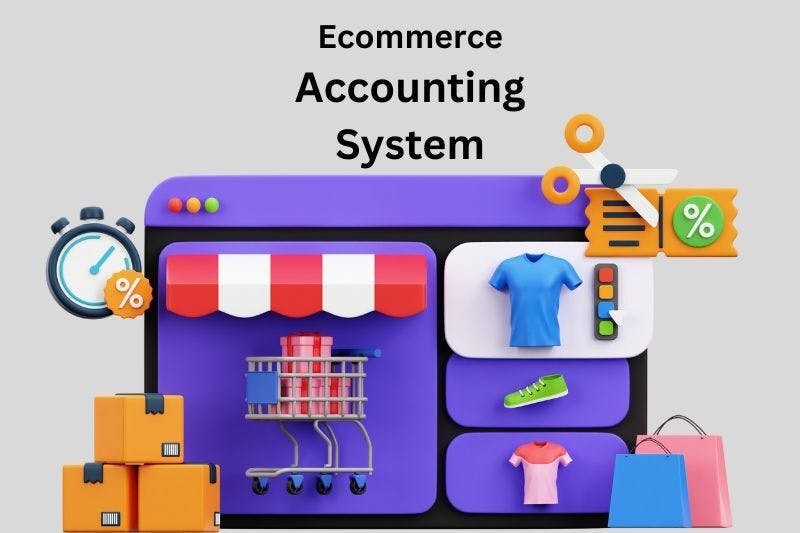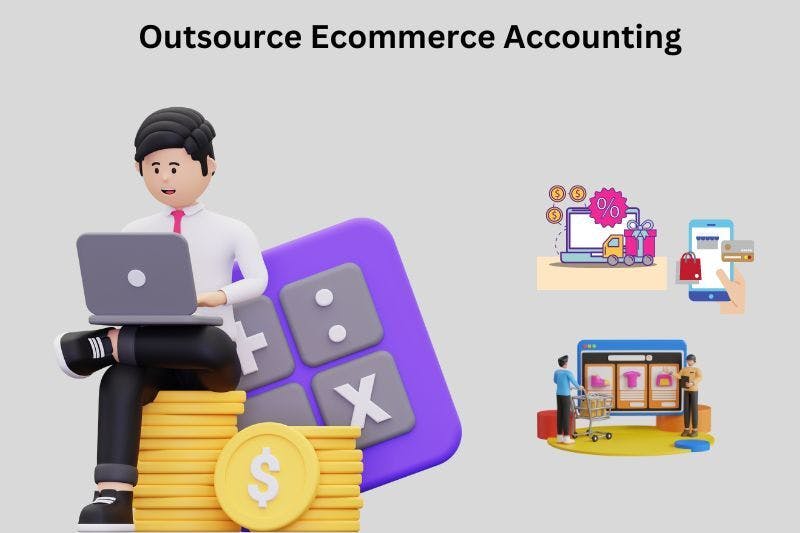
Taking your place in the booming e-commerce industry is exciting. According to etailinsights.com there are 9.8 million ‘e-tailers’ in the world, and 2.8 million of them are registered in the U.S. [1]
With this vast number of online retailers, millions of dollars of products are sold across America daily, and there is an ever-increasing drive to increase sales. This is great news for successful etailers, but the implementation of proper e-commerce accounting principles that cater to your unique sales tax needs, record the cost of goods sold, and generate financial reports is equally important.
Accounting for e-commerce is not just about keeping track of sales and expenses; it is about understanding the unique financial challenges that come with running an online business.
E-commerce accounting
In this article, we’re coming to the rescue with solid accounting advice to help you lay the right foundation for your financial transactions. For starters, let’s consider two important elements to get the ball rolling.
Ecommerce businesses can’t just record income and expenses using cash-basis accounting because you keep inventory. Also, you need the right accounting software that allows you to automate invoices, track payments, and accurately manage inventory. Has any of this crossed your mind?
Let’s look at other important aspects of ecommerce accounting.
The basics of ecommerce accounting

Before looking at the finer details, let’s start with the basics. Ecommerce accounting involves:
Recording and analyzing financial transactions related to online sales, expenses, inventory, and more.
It encompasses various aspects of revenue recognition, cost of goods sold (COGS), inventory valuation, logistics costs, and sales tax compliance.
Revenue Recognition
Unlike your typical brick-and-mortar shop, an e-commerce business deals with multiple payment gateways, subscription models, and complex pricing structures. Properly recognizing revenue is crucial for accurately reflecting the business's financial performance. Different methods of revenue recognition, such as recognizing revenue at the time of sale or upon shipment of goods, are key decisions for e-commerce business owners.
Inventory Valuation
Most ecommerce businesses maintain a fair amount of inventory, which must be accurately valued for financial reporting purposes. The two common inventory valuation methods are the first-in, first-out (FIFO) method and the weighted average cost method. Choosing the appropriate method and consistently applying it is essential for accurate financial statements.
Unique challenges faced in ecommerce accounting
E-commerce is very different from a traditional business model, and several challenges must be overcome to keep your books correct. Let’s look at some of them.
Sales tax compliance

Tax planning and preparation are stressful, made more so by the strict rules and regulations and the documentation you need to keep.
Look, the IRS doesn’t like it when businesses don’t have their ducks in a row. They’re sticklers for using the correct accounting methods, reporting accurate income, and showing your assets and liabilities. This really isn’t an area of business that you should take personal initiative in unless you want to pay heavy penalties.
The best preventative medicine for this kind of headache is to hire an accounting professional. Even if you’re a small ecommerce platform, there are some really good accounting firms, like Hall Accounting Company, out there willing to do the work for you and work out a plan that suits your budget.
Inventory management
Whether you have a small or large amount of inventory, it must be accurately tracked and valued. Proper inventory management is essential to avoid overstocking or stockouts, optimize cash flow, and ensure accurate financial reporting.
Use inventory management software that integrates with your e-commerce platform to track and manage inventory levels, automate reordering, and optimize stock allocation.
E-commerce businesses often deal with a high volume of returns. Implement a returns management system to handle returns efficiently, process refunds or exchanges, and track the reasons for returns.
Ensure your inventory management system integrates seamlessly with your accounting software and e-commerce platform. This allows for real-time updates of inventory levels, accurate cost of goods sold calculations, and streamlined financial reporting.
Multi-channel selling
If you sell your products through various sales channels, such as your website, online marketplaces, and social media platforms, tracking sales and expenses can be interesting.
The person managing your accounting tasks will be kept busy sorting through financial transactions from various sources.
The right accounting software will help a lot here. One that integrates with popular merchants and social media platforms will become invaluable to increasing efficiency and decreasing frustration.
Complex pricing structures
Discounts, promotions, and bundles are all part of the excitement of purchasing products online, but they can complicate accounting tasks involving revenue recognition and can affect profit margins.
International transactions
Large e-commerce businesses that operate globally face additional complexities in providing for currency conversion and complying with foreign tax regulations.
41% of small e-commerce business owners reported doing their own books, according to a survey held online. [2] That’s a huge amount of people who could benefit from the services of an accounting firm. Look at the list above again, these things are not that simple to manage without the proper understanding of accounting principles and regulations governing financial transactions - especially those conducted internationally.
Need help? Schedule an appointment with an accountant at Hall Accounting Company. This initial consultation is free for small business owners.
Essential tips for setting up your ecommerce accounting system

To overcome the accounting challenges faced by ecommerce businesses, you need an accounting system that works its magic for you.
Here are some starting tips you can use straight away to make a difference.
Decide on an accounting method.
As discussed earlier, cash-based accounting is not the most suitable method for an e-commerce business. Accrual accounting better reflects the nature of your income, expenses, and inventory. It will also be more accurate in real-time when it comes to financial records, such as a cash flow statement.
Accounting software
As we’ve mentioned previously in this article, selecting the right accounting software tailored for ecommerce is vital. Look for software that integrates with your ecommerce platform, has features specific to ecommerce accounting, and provides real-time reporting capabilities. Cloud accounting software should be your number one choice as this will give you access to your financial data 24/7 across multiple devices.
Set up a chart of accounts.
A well-organized chart of accounts is essential for accurate financial reporting. A chart of accounts determines which accounts in your general ledger you will post financial transactions to. For the sake of accurate financial data, this task is as important as deciding what platform you will sell your product on or even naming your product.
Why? This is the foundation of ecommerce bookkeeping. Your chart of accounts must reflect accounts for revenue from different channels, shipping costs, refunds, advertising expenses, and discounts.
Set up a business bank account.
This may not seem that important if you are a small ecommerce business owner, but you need to keep your personal and business finances separate. This will also make the reconciliation of your bank account easier as only business transactions will be accounted for.
Automate data entry.
This is an important one for any business with high volumes of invoices and payments. Manual data entry will cut into the time you need to concentrate on other business areas and is a high risk for human error. There are many automation tools capable of scanning documentation and entering the information into your accounting software. Seriously consider this as a business investment.
Implement proper sales tax management.
Use sales tax automation software if you can to accurately calculate and collect sales tax based on the customer’s location.
Can you benefit from outsourcing ecommerce bookkeeping?

Running an e-commerce store is more work than most people think. A little help from a trusted accountant could be just what you need to relieve some pressure.
Hall Accounting Company has been around for a while and knows what it takes to transform a good e-commerce company into a great one! Here’s how you can benefit from our help.
Apart from taking over bookkeeping tasks and tax planning and preparation, we will:
Help you correctly segment your sales - analyze your sales from different channels, products, or customer segments. You will receive key insights into what is driving your revenue. This information will help you make informed decisions about marketing strategies, inventory management, and pricing.
Track your expenses - We will categorize and track your expenses separately for each product or sales channel. This will help you identify areas of high costs and optimize your spending.
Monitor your profit margins - We will help you identify profit margins for each product to determine which is the most profitable. This will guide your pricing strategies and drive your focus on products with higher profit margins.
Implement a budget and financial forecasting- We will create a budget for your business and help you plan your expenses, set financial goals, and track your progress.
Scalability - As your business grows, the accounting requirements become more complex. Outsourcing accounting services can scale with your business, providing the support and expertise you need at each stage of growth.
Prepare and teach you to utilize financial reports - Crucial for making business decisions, these reports will be accurate and up-to-date.
Key financial reports for monitoring business performance
Each set of financial statements shows you a different aspect of your company’s financial health. The end goal of setting up an accounting system is to get to these reports. They help you to take corrective action in real-time.
Income statement: Also known as a profit and loss statement, the income statement shows your revenues, expenses, and net income over a specific period. Analyze this report to understand your gross profit margin, operating expenses, and overall profitability.
Balance sheet: The balance sheet provides a snapshot of your e-commerce business's financial position at a specific point in time. It shows your assets, liabilities, and equity. Monitor this report to assess your liquidity, solvency, and overall financial stability.
Cash flow statement: The cash flow statement tracks the movement of cash into and out of your e-commerce business over a specific period. It shows your operating, investing, and financing activities. Analyze this report to understand your cash flow trends, identify cash flow gaps, and plan for future cash needs.
Sales reports: Generate sales reports that provide insights into your e-commerce business's sales performance. Analyze sales by product, sales channel, customer segment, or geographic region to identify trends and opportunities for growth.
Inventory reports: Use inventory reports to track inventory levels, turnover rates, and stockouts. Analyze these reports to optimize inventory management, identify slow-moving or obsolete inventory, and avoid overstocking.
Conclusion
Accounting for e-commerce businesses is a critical aspect of running a successful online venture. It provides insights into the financial health of the business, ensures compliance with tax regulations, and allows for informed decision-making.
In this article, we’ve provided you with the basic actions for setting up your accounting system, given you essential tips to consider, and provided you with a case for outsourcing your bookkeeping to an accounting firm. There’s a lot to think about. We understand.
Whether you choose to set up an in-house accounting system, integrate accounting software with your e-commerce platform, or outsource accounting services, the key is to prioritize accurate financial reporting and analysis.
So, schedule a call with Hall Accounting Company today to explore how we can help you set up shop without the stress of doing it all yourself.
Footnotes: